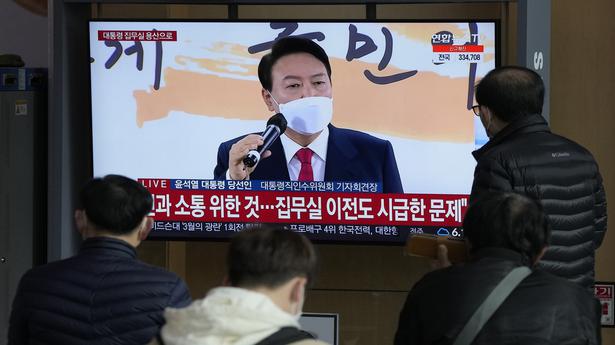
Explained | The change of guard in South Korea
The Hindu
As Yoon Suk-yeol is set to take over as the South Korean President from Moon Jae-In, here is a look at his political and foreign policy agenda, and a snapshot of South Korea’s political history
The story so far: On March 10, Yoon Suk-yeol of the conservative People Power Party (PPP) defeated the Democratic Party (DP) candidate Lee Jae-myung in a close battle to emerge victorious in the South Korean presidential elections.
Yoon will take office on May 10 at the helm of the 300 member-strong National Assembly, which currently has a Democratic Party-majority, post the 2020 general elections. He succeeds Moon Jae-In (DP), who served from 2017 and is precluded from serving again because of a single 5-year presidential term limit.
Yoon gained the popular vote by a margin of less than 1%. While both candidates were viewed as unpopular, voter turnout was high at 77%, just shy of 2017’s record-setting 77.2%. A small chunk of the vote also went to Sim Sang-jung, the Justice Party candidate running on a platform of gender equality.
After his election, Yoon has already made some contentious moves. He proposes to move the presidency from its current location at the Blue House to the Defence Ministry premises in central Seoul, a decision estimated to cost $40 million which has been met with mixed responses from citizens and politicians across the aisle. The Defence Ministry is also reportedly not taken with the move since it means displacement for its staff.
DP candidate Lee, a former Mayor of Seongnam city and later Governor of Gyeonggi Province, ran on a progressive platform that included reducing housing-related taxes, a land tax, a carbon tax and an initial proposal to introduce a universal basic income.
Yoon rose to prominence as Prosecutor-General under the Moon administration, investigating charges of corruption against Moon’s cabinet officials, including former Justice Minister and Moon aide Cho Kuk. He also played a part in the 2017 impeachment of former President Park Geun-hye and in the investigation into supposed attempts by the National Intelligence Service to influence the 2012 elections.
In a first for presidential candidates, neither had been a legislator for the National Assembly and both were relative newcomers to politics and foreign policy.

 Run 3 Space | Play Space Running Game
Run 3 Space | Play Space Running Game Traffic Jam 3D | Online Racing Game
Traffic Jam 3D | Online Racing Game Duck Hunt | Play Old Classic Game
Duck Hunt | Play Old Classic Game











